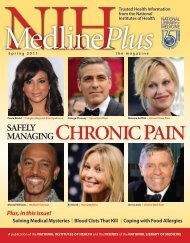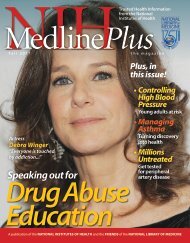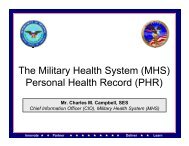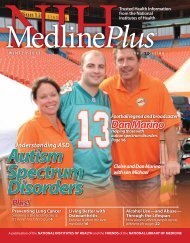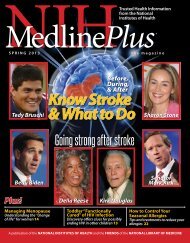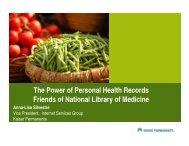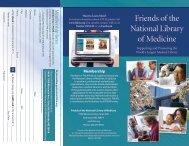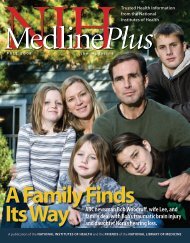Sam Donaldson's cancer survival tips - National Library of Medicine ...
Sam Donaldson's cancer survival tips - National Library of Medicine ...
Sam Donaldson's cancer survival tips - National Library of Medicine ...
You also want an ePaper? Increase the reach of your titles
YUMPU automatically turns print PDFs into web optimized ePapers that Google loves.
<strong>Sam</strong> Donaldson:<br />
Tips From a<br />
Cancer Survivor<br />
For 40 years, <strong>Sam</strong> Donaldson has worked for ABC<br />
News, reporting from virtually every corner <strong>of</strong> the<br />
earth. Winner <strong>of</strong> many journalism and television<br />
awards, the Texas-born Donaldson is also a 10-year<br />
survivor <strong>of</strong> deadly melanoma skin <strong>cancer</strong>. His own experience<br />
with <strong>cancer</strong> and what he has learned since then, have helped<br />
to shape his view that <strong>cancer</strong> patients can work actively to<br />
fight their disease and that there is hope.<br />
Recently, magazine coordinator Chris Klose<br />
sat down with Donaldson to get his personal<br />
experiences with skin <strong>cancer</strong>.<br />
Klose: What went through your mind when<br />
you were told you had <strong>cancer</strong>?<br />
<strong>Sam</strong> Donaldson: I thought I was going to die. I told my wife,<br />
“I think we have about three months.” My mother died <strong>of</strong> it at 93<br />
and my brother <strong>of</strong> liver <strong>cancer</strong> at 49, so I understood what it was<br />
like. I had read that melanoma was a bad actor; that it was unpredictable<br />
and <strong>of</strong>ten could not be charted, from the standpoint <strong>of</strong><br />
the course it might take.<br />
Klose: At that point, did you try to educate yourself about <strong>cancer</strong><br />
and what you should be doing to increase your odds?<br />
<strong>Sam</strong> Donaldson: I didn’t do a lot <strong>of</strong> studying at first because,<br />
fortunately, my treatment began practically immediately. Now, <strong>of</strong><br />
course, I have studied <strong>cancer</strong> for years, and boned up on my own<br />
specialty <strong>of</strong> the “Cancer Club, Melanoma Division.” Although I<br />
am not an oncologist, I think I know a little bit about the disease<br />
now and the survivability <strong>of</strong> various forms and stages.<br />
Klose: Do you believe that more information helps emotionally?<br />
<strong>Sam</strong> Donaldson: Well, I suppose it does. I tell people several<br />
things when talking about the survivors club and what we can<br />
do. First, we all want optimistic doctors. For example, Dr. Steve<br />
Rosenberg, at the <strong>National</strong> Cancer Institute, examined me, looked<br />
at the CAT scan I had had and said, “You know, I think you have a<br />
good chance to live a long, normal, healthy life.”<br />
I blurted out, “I don’t believe you.” In looking back, I realize<br />
that he hadn’t said a “perfect chance.” He said a “good chance.”<br />
But I look at the statistics for melanoma and they have moved<br />
some, and I think it is thanks to Steve and the research he has<br />
ABC News<br />
I thought I was going to die. I told my wife,<br />
“I think we have about three months.”<br />
done on Interleukin 2, trying to find the right combination. Before<br />
1984, the melanoma cure rate was zero percent. Today it is about<br />
17 percent.<br />
Klose: What would be your top three <strong>tips</strong> for people who<br />
have <strong>cancer</strong>?<br />
<strong>Sam</strong> Donaldson: First is the emotional tip: Cancer is not an<br />
automatic death sentence. Yes, half-a-million or more Americans<br />
a year die from all forms <strong>of</strong> <strong>cancer</strong>. But the survivors club<br />
is growing.<br />
The second point is obvious: Get a second opinion, maybe a<br />
third. Someone once said to me, “You may not get to play this<br />
hand more than once, so you want the best cards.” No <strong>of</strong>fense to<br />
the experts, but we’ve all heard stories <strong>of</strong> people who have been<br />
misdiagnosed or about other doctors who had a little bit better<br />
idea <strong>of</strong> what to do. So my strong advice is to get a second opinion<br />
or even a third, so that you can make certain.<br />
And my third tip, I guess, goes back to the first. And that is to<br />
have an optimistic view. Let me stress that, although I don’t have a<br />
medical background, I do believe that, on the margins, such things<br />
as one’s attitude may play a part in recovery versus non-recovery.<br />
I don’t think an optimistic attitude cures <strong>cancer</strong>, but I do believe<br />
that if you can concentrate on the fact that you’re going to live<br />
— not die — it helps.<br />
These are the three <strong>tips</strong> that have helped me and could help<br />
others, too. (Read more about skin <strong>cancer</strong> research and treatment<br />
on page 12.)<br />
www.medlineplus.gov Spring 2007 7



